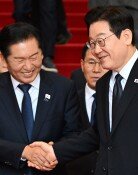South Korea faces urgent need for industrial restructuring
South Korea faces urgent need for industrial restructuring
Posted June. 12, 2025 07:33,
Updated June. 12, 2025 07:33
Last year, nearly four out of 10 South Korean companies failed to cover even their interest payments with operating profits, signaling worsening profitability. This year looks even more challenging as consumer spending plummets and tariff battles sparked by the United States add to the economic shock. Without restructuring so-called “zombie firms,” companies that remain afloat despite persistent losses, even a supplementary government budget is unlikely to produce meaningful growth.
According to the Bank of Korea’s corporate management analysis report, 40.9 percent of the 34,000 non-financial firms in Korea had an interest coverage ratio below 100 percent last year. This figure increased by 1.3 percentage points from the previous year and marked the first time since 2013 that zombie firms accounted for more than 40 percent of companies. Firms with zero interest coverage, meaning they ran deficits, made up 28.3 percent.
Small service-sector companies hit hard by falling consumption and construction firms affected by the real estate downturn are among the most vulnerable. A second extra budget exceeding 20 trillion won, currently being considered by the new administration, could temporarily extend the lifespan of struggling firms. However, indiscriminate support for non-viable companies may delay their exit and crowd out funding for more competitive businesses. Experts warn that without separating healthy firms from failing ones, the entire economic system could collapse.
This context explains why President Lee Jae-myung’s campaign reportedly reviewed restructuring plans for struggling petrochemical and steel firms to help maintain global competitiveness. South Korea’s only large-scale industrial restructuring took place after the 1998 IMF crisis. That effort supported economic competitiveness for more than two decades. However, successive administrations later avoided such painful measures because of potential political and economic fallout, effectively halting restructuring efforts.
Now the economy is so fragile that some have called the situation a second IMF crisis. Without a fresh wave of industrial restructuring, South Korea will face difficulties competing amid global supply chain shifts and aggressive challenges from Chinese manufacturers. Governments in the United States, Japan, and the European Union are already applying a mix of incentives and pressure to overhaul key sectors. With a new administration and a renewed economic agenda in place, now is the most opportune moment for South Korea to address the long-avoided challenge of industrial restructuring.




![[속보]법원 “12·3 계엄은 내란…한덕수, 절차적 요건 갖추게 해”](https://dimg.donga.com/c/138/175/90/1/wps/NEWS/IMAGE/2026/01/21/133201789.1.jpg)

![‘50만원짜리 김밥’ 알고보니…환불 반복에 자영업자 폭발했다[e글e글]](https://dimg.donga.com/c/138/175/90/1/wps/NEWS/IMAGE/2026/01/21/133200737.3.jpg)
